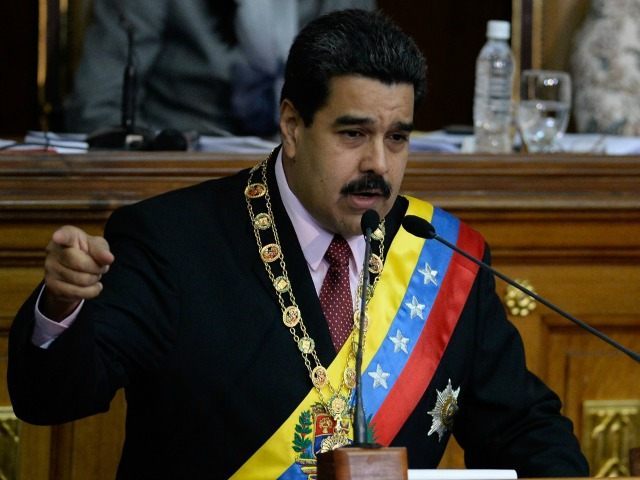Venezuelan socialist head of state Nicolás Maduro has recalled his nation’s ambassador to neighboring Guyana after statements by the latter government that Venezuela was excessively intruding into Guyanese maritime territory.
Accusing Guyanese President David Granger of “vomit”-inducing statements, Maduro urged the international community to support a Venezuelan takeover of Guyanese Caribbean waters.
“It takes a lot of patience to process, digest and not vomit when one reads and hears the statements against Venezuela… by the current president (of Guyana),” Maduro said in a speech to the national legislature, announcing his decision to recall the ambassador to Guyana.
Maduro has also ordered a full review of Venezuelan relations with Guyana. Granger, he claimed, was participating in a “grave campaign to promote hatred, distrust, [and] negative elements regarding the character of the Venezuelan being and his history and the libertarian tradition of the people of Bolívar.” “There is a political, diplomatic, media, and economic operation against Venezuela to implant in our region a tenacious operation seeking high-intensity conflicts,” he alleged.
Guyana’s offending action appears to be business dealings with oil companies, particularly Exxon Mobil Corp, in the Essequibo, a region traditionally belonging to Guyana that Maduro’s government has recently begun to claim as its own. The Guyanese government, anticipating further pushback from Venezuela, has involved the Caribbean Community (Caricom) in the dispute; Foreign Relations Minister Carl Greenidge requested support from other Caribbean nations at the group’s annual summit this week. “Caricom has, after looking at the issue, lent support to Guyana to ensure that Venezuela respects international treaties and boundaries,” Greenidge noted after the summit.
Guyana notes that Venezuela signed an agreement yielding sovereignty of the Essequibo to Guyana in 1899 and that there has been no meaningful change in the status quo that would render that agreement void. In a statement issued to Caricom, Greenidge called Venezuela’s new claims “illegal,” as well as threatening to other states that lay claims to nearby Caribbean waters. Reuters notes that the Essequibo is “in practice part of Guyana” and “shows no discernable trace of Venezuelan influence.”
This did not stop Venezuela from establishing an “integral maritime zone,” including waters near the Essequibo in June, in a move heavily reminiscent of the “Air Defense Identification Zone” China placed over the Japanese Senkaku Islands in November 2013, and belligerent moves against Philippine and Vietnamese fishermen in the South China Sea. The move occurred after Exxon Mobil announced that it had found significant oil reserves in those waters. In response, Guyana immediately labeled Venezuela a “regional threat” and called the maritime zone a “flagrant violation of international law.”
Colombia, which shares waters as well as a border with Venezuela, also issued a statement in June in support of Guyana. While acknowledging that some Caribbean waters remain disputed, the Colombian government warned Venezuela to “avoid unilateral measures and avow itself of common sense regarding issues as delicate as sovereignty and maritime jurisdiction.”
Venezuela had engaged in belligerent acts against American oil companies in the region long before Maduro’s reign, however. In 2013, under Marxist caudillo Hugo Chávez, the Venezuelan military detained an American oil exploration ship in the same waters, a ship that had requested and received permission from the Guyanese government to explore those waters.

COMMENTS
Please let us know if you're having issues with commenting.